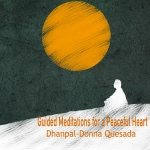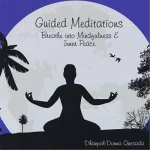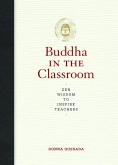 The Taoist term, Wu Wei, is translated literally as non-action. But I prefer Huston Smith’s creative quietude, as it more accurately conveys the sense of this pivotal teaching. At the heart of Taoism is the lesson to flow with the way of nature and its cycles, rather than fight against the inevitable movement of life. That’s what the Tao means…The Way. In this sense, it wouldn’t be incorrect to summarize Taoist teachings as…
The Taoist term, Wu Wei, is translated literally as non-action. But I prefer Huston Smith’s creative quietude, as it more accurately conveys the sense of this pivotal teaching. At the heart of Taoism is the lesson to flow with the way of nature and its cycles, rather than fight against the inevitable movement of life. That’s what the Tao means…The Way. In this sense, it wouldn’t be incorrect to summarize Taoist teachings as…
The Wisdom of Non-Resistance.
Wu Wei is non-resistance in action, or, non-resistance in the context of practical, day to day life. The reason I prefer the respected scholar, Huston Smith’s creative quietude to non-action, is because putting wu wei in action might actually mean doing nothing, but more often, it means choosing the course of action that is the least aggressive and forceful.
A fun and relate-able example is found in the act of floating. I remember when I was a child and first learning to swim, I was impressed when I saw someone float in water…”how can he do that,” I wondered. In my effort to replicate this phenomenal feat, the more I splashed around, the faster I sunk. We all learned the same principal with regard to quicksand through childhood cartoons; the more you struggle, the quicker you sink.
Lao Tzu, presumed founder of Taoism, understood that life is a lot like quicksand. The more we’re able to relax with the current and the ups and downs of the external conditions we find ourselves in, the more tranquility we will feel, in our internal world.
There’s great wisdom found in a person who can curb the ego’s natural tendency to control and conquer. And even the need to know, for sometimes, weird things happen and we don’t know why—this hidden aspect of life is implied in those little dots in the Yin-Yang (Tai Chi-Tu) symbol. Lao Tzu would ask, “who can truly trust in the mysterious flow of life?” Yes, sometimes a correction may be needed when the winds take a sudden turn for the worst, but like the wise sailor who knows better than to confront them head on, he/she wisely uses their fury to his/her advantage, positioning the sails accordingly, with hardly more than a turn of the crank. The panic, the hassle and even the need to know why this is happening are all extra and unnecessary. But more, it is a waste of precious time and energy.
And this is the heart of it…energy, or as the Chinese say, chi. The sailor used the energy of the gale, rather than go against it. In this way, he/she doesn’t deplete his/her own reserves in maneuvering through the storm.
It’s always about preserving and even cultivating chi.
A psychological example might be found in “reverse psychology.” I used to use this common technique with my son, when he was a little boy: “OK, if you insist, go ahead and keep throwing your food on the ground…I’ll have to return your new toy though, since new toys are for good boys.” The same idea is at work when we confront angry people with kindness (as long as it is genuine).
Wu Wei may also be thought of as the gentle way.
It has infiltrated the way Chinese medicine works, with its principle of gently restoring harmony through the restitution of energy flow, as seen in acupuncture. The needles, properly placed, nudge the flow of chi into balance, without the violent effects of harsh chemical drugs, whose side-effects are often worse than the original condition.
But it is perhaps most easily recognized in the martial arts. Here is my student’s description of wu wei at work, in his Kung Fu practice:
We seldom strike first. In that sense, non-action is the first step. We let the aggressor come to us. In our counter attack, instead of using brute force, we move in a way that redirects the energy of the opponent’s attack. Wu Wei is implemented in that we don’t rely on our strength alone, against a possibly larger and more imposing opponent, but rather, on patience, and by navigating through their own energy until the time is right to deliver a blow. We’re moving with the opponent rather than resisting him.
Finally, wu wei implies an understanding, not only of the flux and corresponding challenges of life, but of the relativity of reality. Again, pointing to the Yin-Yang symbol, knowing that we can’t know the light without knowing the dark. We can’t have spring without fall, right without wrong, comfort without discomfort…and if everyone was rich, no one would be rich. Not only can we not know one without the other, but one is inherent within the other. Thus, the Taoist holds back on his judgments about whether circumstances are “good” or “bad.” Often when things seem to go the wrong way, we later find that it was a blessing in disguise. For example, you got off on the wrong exit, but later learned that you bypassed a horrible pileup and catastrophe on the freeway.
The light and the dark arise together. Note the significance of this: Unlike the assumption of western philosophy, which states that one ultimate first-thing causes the next thing, and so on, the Yin and the Yang arise together. And there are no absolutes—there’s a little bit of one in the other, just as there’s a black dot in the white part. There’s a little bit of everything in all of us. So, in all humility, we can be wary of our own tendency to judge, as we probably just haven’t discovered all the hidden qualities yet. And there is no war between the supposed opposites, as they depend on each other for their very existence—just as there is no war against the cycles and challenges of life. Wu Wei is the art of effortless effort in our graceful negotiation of those challenges.
Wu Wei is to allow the movement of life.









